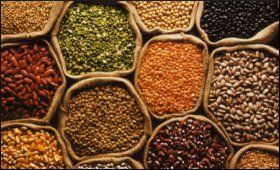|
|
|

|
Centre extends 'free' import policy for three pulses till Mar '22
|
|

|
|
| Top Stories |
 |
|
|
|
SME Times News Bureau | 21 Dec, 2021
The Centre has extended the ease in quantitative import
restrictions policy for pulses such as tur, urad and moong till March
2022.
Earlier, only tur and urad were under the 'free' category,
which was supposed to be over by December 31, an industry insider said.
The
move entails that 'bill of lading' or 'lorry receipts' from the
originating countries need to be obtained on or before March 31, 2022,
and the cargoes should reach Indian ports by June 30, 2022, the Ministry
of Commerce and Industry said in a notification.
The Centre's move is seen as an attempt to stem rising food inflation in the country.
"The
move shall bring stability to the trade and provide continuity of
shipments, thereby ensuring stability of prices, both at the place of
origin and within India. The trade in Myanmar is highly appreciative of
the pragmatic trade policies being adopted by the Indian authorities,"
said Vatsal Lilani, President at Overseas Agro Traders Association,
Myanmar.
Myanmar and Tanzania are two major suppliers of pulses to India.
"Tanzania
is Africa's top pulses' exporter to India and only comes third – behind
Canada and Myanmar – globally. It has always been consistent in
supplying the world's leading pulses consumers with products of good
quality for years now," said Zirack Andrew, national coordinator at
Tanzania Pulses Network.
"This move will help restore the fading
confidence in Tanzania's exporters in doing business with India and wash
away thoughts of abandoning the country in favour of emerging markets
in the Middle East, South Africa, and Singapore. Fairly speaking, it's
long overdue."
Even though India is a major producer of pulses,
its domestic consumption outstrips the production, which pushes the
country to import such commodities from other nations.
To check
inflationary pressure, the Centre has also reduced import duty on
refined palm oil, extended ‘free' import policy for three variants of
palm oil, and banned seven agri commodities from exchange trading.
According
to Bimal Kothari, Vice Chairman, India Pulses and Grains Association
(IPGA): "When comparing the prices of pulses to the price of oil, the
former have remained relatively stable over the last three to four
months. Pulses have not seen a significant increase in their prices.
Chana is being sold for lower than MSP whereas tur and urad are being
sold at MSP, so prices of pulses aren't increasing.
"Tur
harvesting has already been done in many places and is still in progress
in some others. The late rains in the southern states may have caused
some damage. In the next three months, however, tur's availability on
the international market will be limited."
|
|
|
| |
|
|
|
|
|
|
|
|
|
|
|
|
|
|
| |
| Customs Exchange Rates |
| Currency |
Import |
Export |
US Dollar
|
₹91.35
|
89.65 |
UK Pound
|
₹125.3
|
₹121.3 |
Euro
|
₹108.5
|
₹104.85 |
| Japanese
Yen |
₹58.65 |
₹56.8 |
| As on 19 Feb, 2026 |
|
|
| Daily Poll |
 |
 |
| What is your primary "Make or Break" expectation from the Finance Minister this year? |
|
|
|
|
|
| Commented Stories |
 |
|
|
|
|
|
| |
|